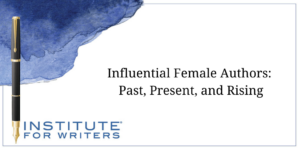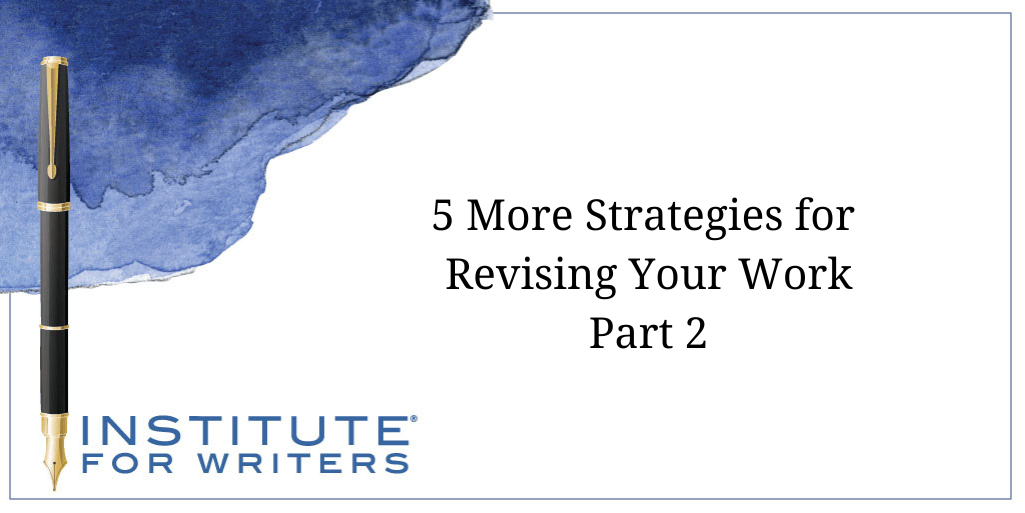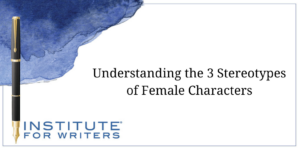
Influential Female Authors: Past, Present, and Rising
We’re going to look at influential female authors of the past, those impacting the present, and whom the industry expects to make a big splash.

In the last two blog posts, we discussed the importance of revision to the writing process and reviewed some strategies to make changes to your written work. (You can find those here and here.)
 If nothing else, the hope is that writers will understand that their first draft is not something that should be submitted anywhere. That draft can always be a stronger piece of writing if some time and effort is devoted to improving what you have written.
If nothing else, the hope is that writers will understand that their first draft is not something that should be submitted anywhere. That draft can always be a stronger piece of writing if some time and effort is devoted to improving what you have written.
I have heard the necessity of the revision process compared with making soup for a dinner party. A cook would probably not just toss the ingredients into a pot and set the burner to simmer. Most likely the cook would try a taste and then add salt, pepper, or some other spice before letting it sit and simmer for a while. Later, he or she would probably try the soup again and would tinker with adding additional spices until they are satisfied that it tastes perfect before serving it to their guests.
Let’s take the pot of soup ingredients and see how it can be further improved now that you have considered the strategies in the previous blog post.
It is tricky to have someone read your work. If they are a friend or family member, it may be difficult for the reader to be critical about something you—who they like—have written. Sure, give the manuscript to them and see what they say, but also give it to someone who is not at all attached to you for more of an unbiased assessment. (Being part of an online or in-person writing group is helpful for getting good feedback.)
Ask the reader to jot down their thoughts after they have read your writing. You could also develop three questions (anything more than that could become a chore for your reader) about the manuscript, for example:
(fiction) What did you think of the way Mary met Anthony?
(nonfiction) Did the details about the volcano erupting help you see the process?
It is also helpful to ask: What is the best part about this story or article? What is the weakest part of this story (or article)?
 The reader does not necessarily have to write down their thoughts—this could be a discussion, too. Must you change your manuscript based on what your reader says? No, but you should consider their opinion and think about whether you need to revise.
The reader does not necessarily have to write down their thoughts—this could be a discussion, too. Must you change your manuscript based on what your reader says? No, but you should consider their opinion and think about whether you need to revise.
As you read, listen for words that seem out of place, sentences that are difficult to read or understand, and dialogue that does not sound realistic for your character or the scene. Think about your target reading audience and ensure that the text and content work appropriately for them.
Don’t stop reading when you come to a potential change area but keep moving through the text. Highlight instances, for example, where you are telling readers what is happening in the story rather than having the characters show it; using adverbs instead of adding action, misspelling or misplaced words, or anything else that you want to go back to. If you are using your Word program, turn on Track Changes so you can add quick comments to return to after you have finished reading the entire manuscript.
It works well to imagine you are someone else reading your story or article, as it can give you fresh eyes and ears as you work through the piece.
Each word, sentence, phrase, and paragraph should have a reason for being in your piece of writing. If it does not add value to your manuscript, remove it—if you can delete any parts of your manuscript without altering the meaning, that text did not belong there in the first place.
 One good activity to tighten up your writing is to write down your word count. Then slowly read through the text and delete at least ten percent of the words. Do a second attempt and delete another ten percent. If you dare, do this one more time, so by the end of the activity you will have 30 percent fewer words in your story or article. The manuscript is going to have the same meaning but will be trimmer, tighter, and ultimately better.
One good activity to tighten up your writing is to write down your word count. Then slowly read through the text and delete at least ten percent of the words. Do a second attempt and delete another ten percent. If you dare, do this one more time, so by the end of the activity you will have 30 percent fewer words in your story or article. The manuscript is going to have the same meaning but will be trimmer, tighter, and ultimately better.
(Afraid to take all those words out? Make a copy of your original manuscript first so you have the original text to refer to if you want to go back.)
Using one, or a combination of a few revision strategies will help you hone the ideas in your story or article. Try different methods to keep the process somewhat enjoyable until you realize you are most comfortable with one particular strategy.
Many writing students I work with (and also, many well-known writers) are not always able to find their own proofreading errors. I usually suggest that they ask a high school or college student (since they are in the thick of things from writing papers) or a trusted friend. It is important to stress to those proofreaders that you want them to just look for errors in spelling, capitalization, punctuation, and grammar, and that you are not looking for comments about the content of the writing.
“Please,” you could tell them. “No more revisions!”
Susan Ludwig, MA has been an instructor with the Institute of Children’s Literature for almost twenty years. Susan’s writing credits include teacher resource guides, English language learner books, and classroom curriculum for elementary through high school students. A former magazine editor, she assesses students’ written essays as a scoring director for the ACT and SAT exam. When she is not writing or working, she is usually found playing with her grandsons or curled up with a good book.

We’re going to look at influential female authors of the past, those impacting the present, and whom the industry expects to make a big splash.

This week, we’re focusing on how we as writers can create strong female characters that others will look up to, instead of harmful stereotypes.

Is your writing routine reaching its potential? Maybe it’s time to take another look so you can see what’s possible for your writing.
1000 N. West Street #1200, Wilmington, DE 19801
© 2024 Direct Learning Systems, Inc. All rights reserved.

1000 N. West Street #1200, Wilmington, DE 19801
© 2025 Direct Learning Systems, Inc. All rights reserved.

1000 N. West Street #1200, Wilmington, DE 19801
©2025 Direct Learning Systems, Inc. All rights reserved. Privacy Policy.